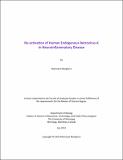Re-activation of Human Endogenous Retrovirus-K in Neuroinflammatory Disease
Metadata
Show full item recordAuthor
Manghera, Mamneet
Date
2015-07Citation
Manghera, Mamneet. Re-activation of Human Endogenous Retrovirus-K in Neuroinflammatory Disease; A thesis submitted to the Faculty of Graduate Studies in partial fulfillment of the requirements for the Master of Science degree, Department of Biology, Master of Science in Bioscience, Technology, and Public Policy program, The University of Winnipeg. Winnipeg, Manitoba, Canada: University of Winnipeg, 2015.
Abstract
A new appreciation of the microbiome is changing the way we perceive human health and disease. The holobiontic nature of humans is even etched into our DNA in the form of viral symbionts. Empirical evidence for the presence of endogenous retroviruses (ERVs) in the human genome and their activity in homeostatic and pathological states has accumulated; however, no causal relationship with human disease has been established to date. In this review, we will focus on the role of endogenous retrovirus-K in neurological disease. Specifically, we will attempt to reconcile the pathological contribution of ERVK in disparate neurological diseases by providing evidence as to inter-individual differences in ERVK genotypes, addressing the molecular regulation of ERVK, and providing detailed examples of ERVK-mediated processes in nervous system diseases.

